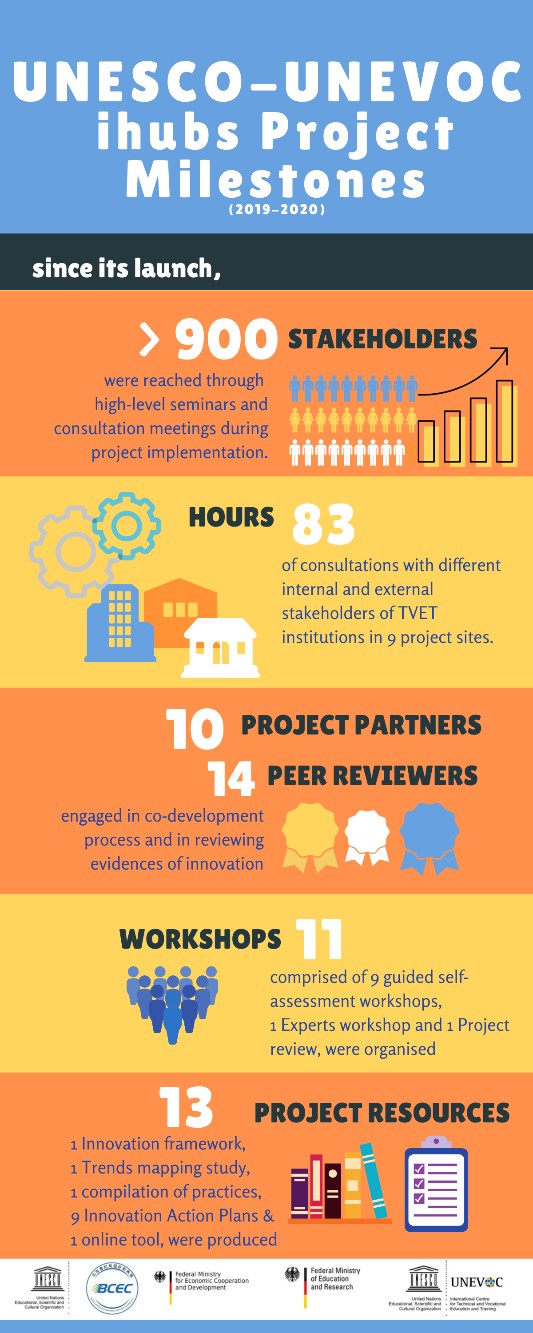Home: The i-hubs initiative | Project timeline | What is the i-hub? | Who are the i-hubs?
Recent developments: General Project News | News from the i-Hubs
Guided Self-Assessment: About | Calendar | Indicative Programme
Innovation Toolbox: The Balanced Scorecard | Skills and Innovation Ecosystem Map
Knowledge resources: Publications | Other useful resources
Networking for innovation: Discussion forum | Project documents | Network visualization map

About the Skills for Innovation Hubs project
The transition to a green and digital economy has ushered in new developments in the world of work, it has changed the way individuals and societies learn and engage. As a result, there are new forms of work, entrepreneurship and market-based solutions emerging. TVET institutions are facing increasing demands for substantial change to respond to these developments and engage in innovative ways of TVET delivery.
In 2019-2020, the Skill for Innovation Hubs initiative was conceptualized to address these issues by developing TVET institutions for entrepreneurship, innovation and sustainability. The project sought to mobilize institutions and develop tools to empower them to implement skills for innovation and engage in peer learning.

Pilot project
Ten TVET institutions from the UNEVOC Network were mobilized to co-develop with UNESCO-UNEVOC an institutional innovation framework to develop skills for innovation, promote innovation in TVET and learn from international practice. Partner TVET institutions in 10 countries (China P.R., Finland, Germany, Kenya, Malta, Nigeria, Philippines, Seychelles, Spain and Sri Lanka) were engaged to co-develop and test the tool’s usefulness, evaluating their innovation performance in the four inter-connected dimensions of innovation - strategy and management, teaching and learning, products and services, and ecosystem relationship management.
Through this process, the participating institutions were, on the one hand, given the tool to assess their performance against the innovation dimensions, and on the other hand, made to discover the inner workings of innovation as a path for their future. This process helped establish an understanding of their collective strengths and areas for improvement on the basis of their own local context and innovation demands. The partners consolidated and documented their respective innovative practices and developed their own innovation action plan with the help of a team of experts and peer reviewers.
The project has succeeded in raising the importance of innovation in the partner institutions. For BKaL![]() in Germany, this realization has become evident as it pursues developing the 360° initiative to make TVET more attractive and strengthen labour market outcomes for its graduates. In Finland, Omnia is pursuing innovation that can develop a stable supply of sustainable workforce to impact on multiple levels - social, cultural, environmental and economic. This is embodied in the design of one of its newest innovation ventures, the Omnia Skills Centre for Migrants. In the case of RVTTI in Kenya, their cooperation in the project has reinforced the need for investing in the innovation skills of young students and creating a platform where students can engage in socially-relevant and commercially-attractive innovations, and develop their innovation competencies.
in Germany, this realization has become evident as it pursues developing the 360° initiative to make TVET more attractive and strengthen labour market outcomes for its graduates. In Finland, Omnia is pursuing innovation that can develop a stable supply of sustainable workforce to impact on multiple levels - social, cultural, environmental and economic. This is embodied in the design of one of its newest innovation ventures, the Omnia Skills Centre for Migrants. In the case of RVTTI in Kenya, their cooperation in the project has reinforced the need for investing in the innovation skills of young students and creating a platform where students can engage in socially-relevant and commercially-attractive innovations, and develop their innovation competencies.
Future application of the innovation framework in institutions
The publication, Innovating technical and vocational education and training – a framework for institutions, has been developed to provide guidance and document innovative practices in TVET.
Participatory co-development process
It provides a methodological framework that works to help management and institutional stakeholders understand the concept of innovation in an institutional development setting or work around their own existing practices to become more efficient and adaptable to change. The framework has been tested in nine i-hubs partner institutions, taking into account a wide range of settings. The framework offers an innovation toolbox deployed to initiate autonomous or guided self-assessment as well as gather data for analysis among key stakeholders. Institutions that have gone through the process are informed of their innovation performance, using a maturity model matrix, and their potential areas for improvement.
A framework for institutions
Global developments including the transition to greener economies, the application of digital technologies in the world of work, and the COVID-19 pandemic, amongst others, are changing the way we live and work. These developments are driving technica ...
The development of the framework also presented ample opportunities to consolidate institutional experiences in implementing innovative projects and initiatives. These practices have been documented in collaboration with the i-hubs project partners to serve as concrete examples of innovation in TVET.
Innovation and the Future of TVET
As TVET adapts itself to the impacts of social, environmental, and economic disruptions, institutions are expected to improve upon existing practices or develop new approaches to positively impact the future of skills development. This framework offers schools, training centres and colleges the opportunity to be key drivers of innovation in their local skills and innovation ecosystem. It is an important tool that UNESCO-UNEVOC will use to support institutions in their drive for innovation under the UNEVOC Medium-Term Strategy for 2021-2023.
Resources
Innovative practices at a glance
Trends mapping – Innovation in TVET
Stay in touch